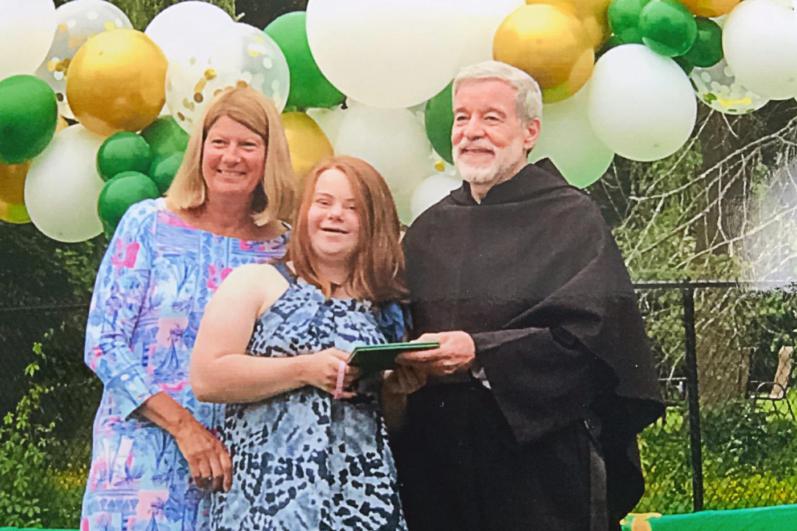Student who catalyzed special ed program graduates St. Augustine School
ANDOVER -- When Abigail "Abby" Agudelo received her diploma from St. Augustine School on June 11, it was a milestone not only for her but also for the whole community, as she became the first student with Down syndrome to graduate from the K-8 school.
When her name was called, Abby stood and did a little jig before going up to accept her diploma from two people who had accompanied her from the beginning of her time at the school: Father Peter G. Gori, OSA, the pastor of St. Augustine Parish; and Paula O'Dea, the school's admissions director, who was the principal when Abby first enrolled nine years ago.
Mark Daley, the current principal, said it was "a really special moment" to see "the joy on Abby's face," as well as "her classmates so happy to see her graduate."
"You could tell everyone who was present recognized how special of a moment it was," he said.
Abby had already completed a year in a public school when her parents approached St. Augustine School about enrolling her in kindergarten. The school did not have a special education teacher at the time, and they were not sure whether they would be able to give Abby the support she would need.
On the other hand, "We knew that as a Catholic school we should be able to open up our school to all God's children," O'Dea said in a June 21 interview.
O'Dea and Father Gori met with Abby's parents and agreed to do research to figure out if they could support her. After meeting with other families of children with Down syndrome, and having Abby complete the regular screening for kindergarten, the decision was made to admit her.
According to O'Dea, St. Augustine School has had students with various disabilities and individual education plans (IEPs), but none had ever required as much alteration in the way they were taught.
Daley, who became the principal of St. Augustine School at the start of Abby's final academic year, said Abby served as a "catalyst" for the special education program, as more teachers underwent additional training and professional development during her time there.
Each of Abby's teachers attended a two-day seminar about educating children with Down syndrome before she entered their class.
The school also took advantage of a fellowship program offered by Merrimack College, whereby a school pays for a student's tuition for a year and receives a teacher in training. Most of the fellows were teachers earning a second degree, and the ones who came to assist Abby in the classroom were learning about moderate disabilities.
From grade two onward, a Merrimack fellow served as a second teacher in Abby's class, so she could receive individual attention, if needed.
"That worked out wonderfully, and she had such wonderful bonds with all her classroom teachers and her Merrimack fellows along the way," O'Dea said.
Most of the time, Abby followed the same curriculum as her classmates. But sometimes her lessons were modified so she could process and demonstrate her understanding of the material in different ways. For assignments that involved a lot of writing, she might use speech-to-text technology or complete a different kind of project. O'Dea said she "did more hands-on life experience."
"She just blossomed as a student, and we just, I felt, blossomed as a Catholic school that could offer a good inclusion program to students with special needs," O'Dea said.
Many Catholic schools do not have substantial programs for special education due to staffing and budgetary limitations. They often lack the financial resources to hire more teachers trained to work with children with special needs.
O'Dea said she would encourage other Catholic schools to avail themselves of any opportunities to get volunteers or assistants that could help disabled students. Many colleges have programs like the Merrimack College fellowship, which can provide personnel that are highly qualified but less expensive than other teachers.
Daley said he thinks Catholic schools can better serve students with special needs by training the staff they already have and focusing on what they already do well. The mark of Catholic schools, he said, is that every child is seen and treated as someone made in the image and likeness of God, and that means educating them well.
O'Dea and Daley both spoke of the importance of a strong partnership between parents and teachers. O'Dea said they received a lot of support from Abby's parents.
"We as a school learned so much from her. We definitely have learned and grew as professionals, learning how we can give the services to this whole new population of God's children," O'Dea said.
She said they had to "relearn" a lot and "reteach" themselves along the way.
"But I think in the end, everyone that had any dealings with Abby -- anyone from the custodial staff to the nurses to the teachers to the pastor to myself -- we just learned so much and we're so grateful that her parents chose St. Augustine School," she said.
Daley spoke of the impact that Abby made on the school, prompting them to redesign their special education program.
"It's been clear to me, from this year, that Abby's been a great blessing to our school," he said, speaking to The Pilot on July 12.
He said they are "definitely hopeful" that they will be able to welcome "as many children as possible" in the future, thanks to the changes that Abby brought about.
"I think her legacy is going to continue in more ways than one," he said.



















